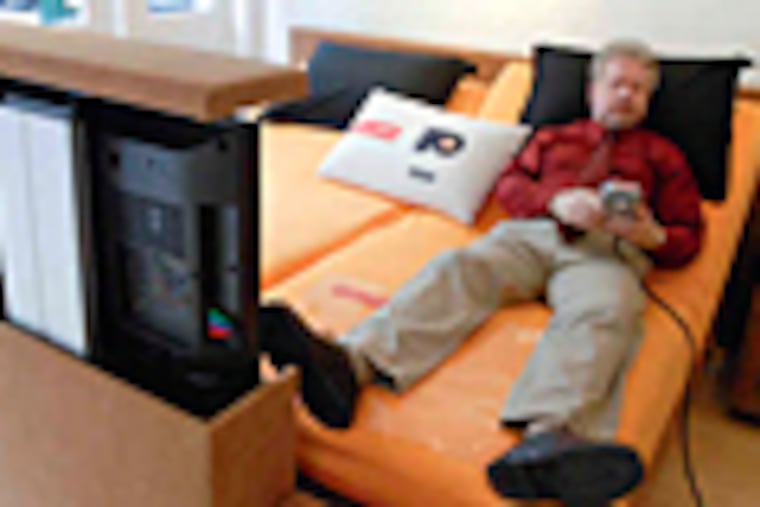Monica Yant Kinney: No fairy tale: Once upon a $50,000 mattress
Jim Findley spends his waking hours thinking about sleep. He has a doctorate in clinical psychology and a waiting list of insomniacs eager to get in the Behavioral Sleep Medicine Program at the University of Pennsylvania's Center for Sleep, where many patients also suffer marital fury.

Jim Findley spends his waking hours thinking about sleep. He has a doctorate in clinical psychology and a waiting list of insomniacs eager to get in the Behavioral Sleep Medicine Program at the University of Pennsylvania's Center for Sleep, where many patients also suffer marital fury.
"There is no person more hated in the middle of the night," Findley shares, "than the sleeping spouse of someone who can't sleep."
Well, except the sleeping spouse who snores.
I invited Findley on a field trip to Old City to check out Hollandia International's new flagship store - home of the $50,000 bed.
The window display on Third Street entices with the $25,000 Executive, a split-king with a retractable 32-inch flat-screen TV, milk-chocolate suede frame, and crease-proof Flyers-orange sheets treated with aloe vera and silk protein hugging a luxe latex mattress that, supposedly, fights night sweat.
Findley has never seen anything like it. At my urging, he plops down, grips the remote control, and closes his eyes.
The dream factory
Hollandia was founded by an Israeli artichoke farmer with an aching back. The 29-year-old company promises to fulfill any customer's desire, including the guy whose wife threatened to divorce him for keeping his gun under his pillow.
"Now," explains vice president Maya Ben, "we have beds with built-in safes."
I tell Ben that for $20,000, I want George Clooney tucking me in. A $50,000 bed should make me coffee and change its own sheets.
Currently, Hollandia offers no human accessories, but one VIP client has a monstrous mattress measuring 8 by 10 feet. So I guess I'm not the only territorial sleeper with a husband who zonks out in a zone he dubs "Dave's Nation."
"Ninety-five percent of our customers," Ben confides, "don't even want to be on the same level with their partner."
To honor their wishes, Hollandia promotes adjustable beds that allow a wife to rest on her side at a 45-degree angle while her mate sprawls on his back and elevates his legs. The hypoallergenic mattresses are woven with coconut fibers and can be flipped for optimal seasonal slumber: The soft side stays cozy in the winter; firm keeps you cooler in the summer.
Showroom manager Stefan Sklaroff points to an $1,899 daybed as proof that "there's a bed here for everyone." But, really, everyone wants to talk about the tricked-out Sphere system, a mod canopy with a TV, surround sound, a wine fridge, and an iPod docking station.
"It's good," Sklaroff thinks, "to fall in love with your bed."
Beds are for sleeping
Over coffee at Cafe Ole next door, Findley acknowledges that the Hollandia beds are "extremely comfortable." The academic (whose center's website is at www.sleeplessinphilly.com) is intrigued by the temperature-regulating mattress and adjustable frame, saying both features could ease the pain and anxiety of the chronically sleep-deprived.
"Empirically, it's hard to say" whether a mattress matters, since scientists haven't really studied whether a particular sleep surface - coil, foam, hardwood floor, dirt - affects restfulness. But with 40 percent of the population suffering from occasional insomnia, no sleep specialist would recommend a bed with champagne holders and all those electronic distractions.
"We don't want the bed to be associated with wakeful activities," Findley says. So, technically, Hollandia's corporate mantra - "let's stay in bed" - is antisleep?
"Many patients already spend too much time in bed," he cautions. "In a sense, we do cause a lot of our own problems."
Findley tells me he gets 71/2 hours of sleep a night on a bed of unknown provenance he bought six years ago from the Marriott chain.
So if an insomniac could afford a $50,000 remedy, I ask, would indulging in extreme sleep help her achieve it? Can price tags have positive placebo effects?
"It's possible," Findley figures, "that if you think you're going to sleep better, you might." But in the dark, there are no guarantees.